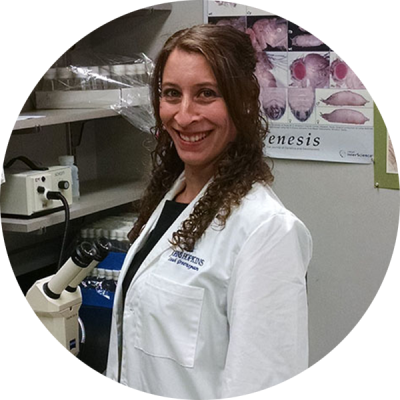
Leah Greenspan
I did my research in the laboratory of Erika Matunis. This lab studies stem cell regulation using the fruit fly, Drosophila, testis stem cell niche as a model organism. I discovered that loss of the tumor suppressor gene retinoblastoma in niche cells, the cells that support and help maintain the stem cells, can cause niche cell proliferation, conversion of niche cells to stem cells and formation of ectopic niches. This finding is important because it shows that modulation of niche cells, not only the stem cells they support, can be important for tissue regeneration but can also lead to cancerous phenotypes when dysregulated.
Questions & Answers
Why did you choose Johns Hopkins for your work?
I chose Johns Hopkins for my graduate school because I felt it was the best environment for me to learn and thrive as a scientist. The renowned faculty and collaborative atmosphere have provided me the intellectual stimulation and support necessary to be successful.
What does receiving this award mean to you personally and professionally? Do you have any connection with the particular award you received?
Although I have no personal connection with the particular award I received, it is definitely an honor to be selected as a Young Investigator award recipient. Personally, it is an affirmation that all the late nights and weekends spent in lab were worthwhile. Professionally, it demonstrates that my research is well-regarded by the Johns Hopkins faculty, and it further drives me to pursue a research career.
What contributed to your project’s success (special skills, interests, opportunities, guidance, etc.)?
My project’s success stems from my pure drive to uncover the answers to the hypotheses I am testing. I am constantly coming up with new questions and experiments to try. This is mostly thanks to discussions with my amazing lab mates and my mentor, Erika Matunis, who inspire my best ideas.
What thoughts do you have about Young Investigators’ Day itself, as a celebration of the roles student and fellows play in research at Johns Hopkins?
It is amazing that Johns Hopkins has a day to recognize and celebrate the roles students and fellows play in the research here. A lab can only be as successful as the people who work in it. This day helps us remember that we are part of something bigger, a scientific community that together strives to make a lasting impact on society through research and discovery.
What has been your best/most memorable experience while at Johns Hopkins?
One of my most memorable moments at Johns Hopkins was the first time I looked through the microscope and saw the dramatic phenotype that results from knocking down the protein I study (retinoblastoma). It was a week before my first thesis committee meeting, and I knew I discovered something interesting that would drive the rest of my thesis research.
What are your plans over the next year or so?
I plan on graduating this summer and am currently interviewing for postdoctoral positions.
Tell us something interesting about yourself that makes you unique. Do you have any special hobbies, interests or life experiences?
I love challenging myself, whether it is professionally or personally. I especially love a good physical challenge, such as completing a half-marathon, rappelling down waterfalls in Nepal or hiking the snowy hills of Yosemite National Park.